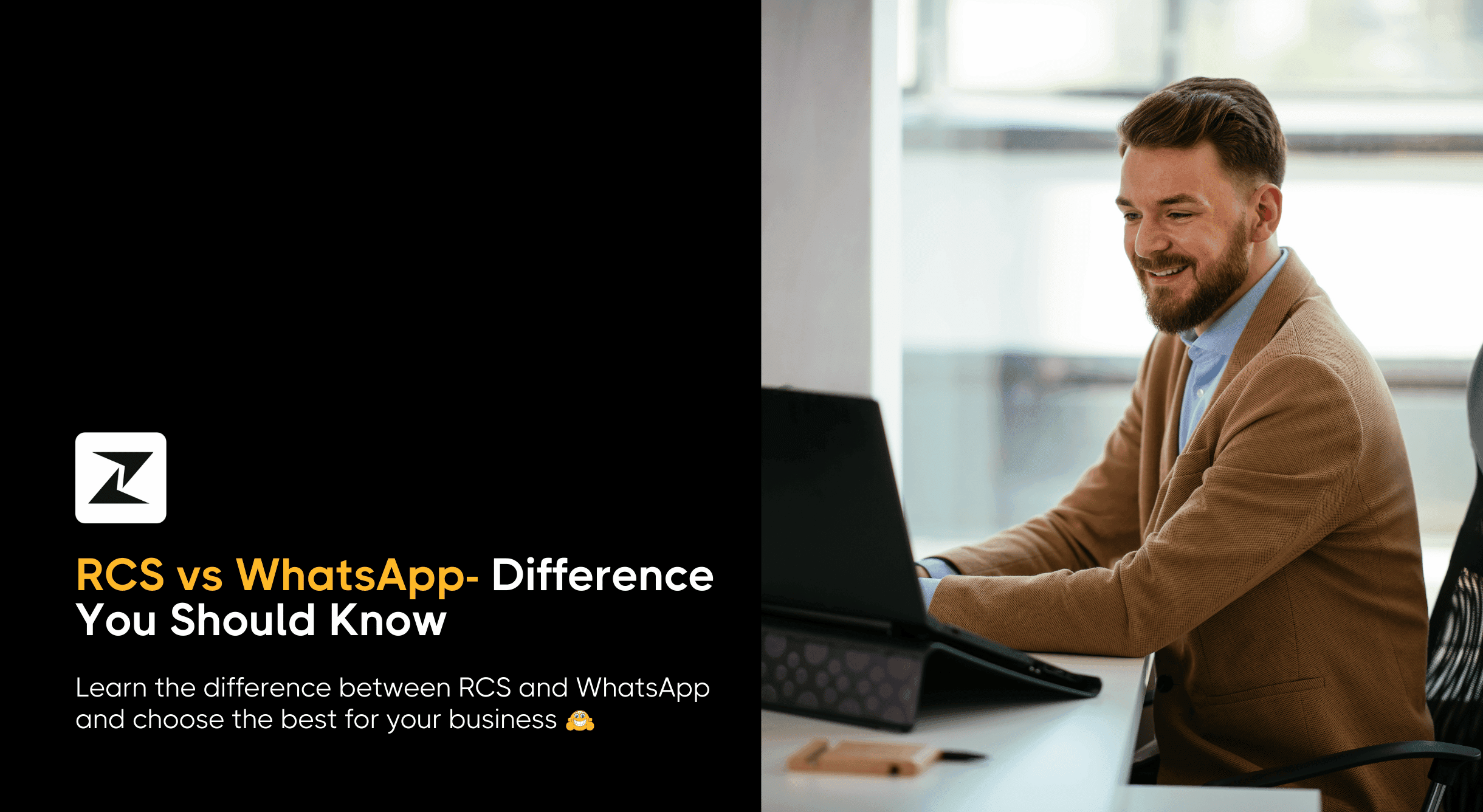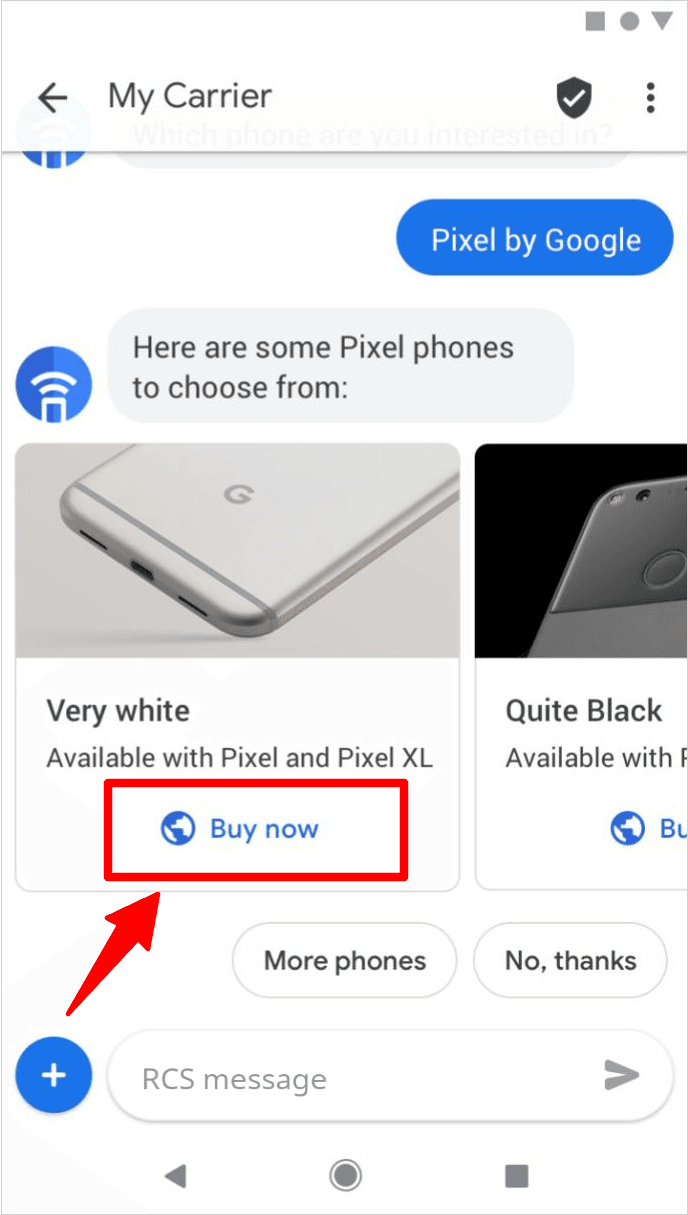RCS vs WhatsApp: Which Is Better for Your Business in 2026?

Choosing the right messaging platform for your business in 2025 involves evaluating your options carefully. RCS and WhatsApp are two leading options that offer unique benefits for customer communication.
Let’s take a step back. Remember when text messages were just short, basic bursts of information? WhatsApp changed the game by adding rich media, group chats, and a real-time connection that businesses quickly embraced to enhance customer interactions.
Now, there’s RCS for messaging, a new option that aims to take messaging to the next level. With promises of even richer features, better integration with your phone, and a more seamless user experience.
In today’s competitive communication world, where customer experience is crucial, selecting the right messaging platform can significantly impact your business.
Don’t worry, I’ve outlined and compared the features and capabilities of both RCS and WhatsApp, to help you make an informed decision. This comparison will guide you in selecting the platform that best suits your business needs and goals.
Let’s delve into the details.👇🏻
What is RCS?
RCS is the next big thing in messaging. Created by the GSM Association, RCS is set to replace traditional SMS and MMS with a host of upgraded features.
Plus, RCS Business Messaging (RBM) is a version of RCS designed for businesses like yours to connect with your customers. It lets you send interactive messages, including product catalogs, order confirmations, shipping updates, and customer support inquiries.
It’s designed to bring you the best of both worlds: the reliability of SMS combined with the advanced features of popular messaging apps. For your business, this means better customer engagement, sales, and a more interactive messaging experience.
What is WhatsApp?
WhatsApp is a powerful tool for your business, with over 2 billion monthly active users worldwide. If you’re running a smaller enterprise, you can use the free WhatsApp Business platform to set up a verified profile, automate messages, create a product catalog, and provide customer support, all in one place.
For larger businesses with high messaging needs, the paid WhatsApp Business API is a great option. With a remarkable 98% open rate for messages, WhatsApp helps you build strong customer relationships and boost engagement effectively.
I hope now you have a good grasp of both channels. Let’s move on to comparing them.👇🏻
RCS vs. WhatsApp: Weighing both channels to select the ideal option
It’s really important for you to assess each platform carefully before choosing one for your business to simplify your sales process.
So, let’s evaluate RCS and WhatsApp to find the best fit for you, ensuring that you can streamline your communications, enhance security, and optimize your overall business efficiency.
Features
RCS and WhatsApp both offer messaging services, but they have different features that meet various needs.
RCS enhances the traditional SMS experience with a range of advanced features. It supports high-quality media sharing, allowing users to send images and videos in better resolution compared to standard SMS.

Also, RCS includes read receipts and interactive elements, such as quick reply buttons and carousels, creating a more dynamic and engaging messaging experience.
On the other hand, WhatsApp offers a robust suite of communication tools, with a focus on seamless text, voice, and video conversations. It stands out with its capabilities for document sharing, WhatsApp group chats, broadcast lists, and end-to-end encryption, making it a popular choice for both personal and business use.
Beyond its core messaging features, WhatsApp offers tools specifically designed to help you manage your business more effectively. The WhatsApp Business application is ideal for smaller businesses and provides a range of useful features.
You can create a business profile to present a professional image, set up greetings and away messages to manage customer expectations and use quick replies to streamline communication.
Plus, you can showcase your products with catalogs, facilitate online purchases with shopping carts, and handle orders more efficiently. The app also provides message statistics to help you track and improve your communication performance.
If you run a larger business, the WhatsApp Business API offers more advanced tools. It allows for extensive automation, integrates with WhatsApp CRM tools like Zixflow to provide a seamless customer experience, and supports sending interactive messages.
This can help you manage a high volume of customer inquiries more efficiently and engage with your customers in more dynamic ways. With these advanced features, the API is well-suited for your business if you are looking to scale your communication efforts and enhance your customer interactions.
Connect your WhatsApp Business account with Zixflow in a few minutes and select pre-approved WhatsApp templates, automate your tasks to enhance your communication reach & gain more sales
Log In TodayReach
The availability of RCS and WhatsApp can have significant business implications due to their differing global reach.
RCS’s access is somewhat limited because it depends on carrier support, which means its availability is confined to specific regions and networks that have adopted the technology. This limitation can restrict if you are looking to engage with a broader audience, as RCS is not as universally accessible.
In contrast, WhatsApp offers a substantial advantage with its impressive global reach. As I’ve mentioned above, with over 2 billion active users across more than 180 countries, WhatsApp is accessible to nearly anyone with a smartphone.
The extensive reach of WhatsApp allows your business to engage with customers across various regions, maximizing your messaging efforts and broadening your market presence.
Automation
When it comes to business automation, RCS and WhatsApp offer different capabilities that can significantly affect how you manage your customer interactions.
RCS provides some automation through RCS Business Messaging, allowing for features like automated responses and message routing. However, its automation capabilities are currently more limited compared to those offered by WhatsApp.
The WhatsApp Business API, on the other hand, provides a robust set of automation tools, including advanced chatbots and customizable business message templates.
These tools enable you to streamline your business communication processes, handle a high volume of interactions efficiently, and deliver a more personalized customer experience.
Privacy & security
Privacy concerns are crucial when choosing a messaging platform for your business, and the differences between RCS and WhatsApp highlight their varying levels of security.
RCS uses encryption, but the level of security can vary depending on how different carriers implement them. This variability means that RCS might not offer the same consistent level of protection as WhatsApp, potentially leaving your communications more vulnerable.
On the other hand, WhatsApp places a strong emphasis on user privacy with its end-to-end encryption. This means that only you and the recipient can read your messages, ensuring that your communications remain private and protected from unauthorized access. For your business, this provides peace of mind that sensitive information, and conversations are secure and boosts your sales efficiency.
After exploring the core differences between RCS and WhatsApp, there are additional key distinctions to consider. For a full comparison of RCS and WhatsApp, check the table below to get all the details to make an informed decision.👇🏻
| Features | RCS | |
|---|---|---|
| Base technology | Enhanced SMS/MMS. | Over-the-top (OTT) messaging. |
| Encryption | In transit. | End-to-end. |
| Network reliance | Carrier network. | Internet. |
| Read receipts, typing indicators | Yes | Yes |
| Verified business profile | RCS messages show your logo and brand name at the top with a verified status. | Widely available for businesses and verified public figures. |
| Web/ desktop version | No | Yes |
| Platform dependence | Carrier support. | Cross-platform (Android & iOS). |
| Disappearing messages | No | Yes |
| Privacy | Less secure due to the absence of end-to-end encryption. | More private due to end-to-end encryption. |
| Market penetration | Nearly 4 billion Android users. | Dominates the messaging market with over 2 billion users worldwide. |
| Group chats | Yes | Yes |
| Share location | Yes, allows sharing real-time locations. | Offers accurate real-time location sharing with various options, including live & static location. |
| Document sharing | Basic document-sharing capabilities. | It supports sharing various document formats (PDFs, Word documents, etc.). |
| High-quality media sharing | Yes | Yes |
RCS vs. WhatsApp: Choose the correct fit for your business communication
Choosing between RCS and WhatsApp for your business ultimately depends on what you value most in a messaging platform. If you’re interested in modernizing your SMS communications and can work within its regional limitations, RCS offers some advanced features like high-quality media sharing and interactive elements.
On the other hand, if you want a solution that offers broad global reach, robust automation capabilities, and strong security for WhatsApp marketing, WhatsApp is likely your best bet.
So, for a well-informed decision, consider your specific needs regarding reach, automation, and security to choose the platform that aligns best with your business goals.
